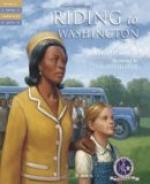“Is there sae mony lads i’ Blackpool, that’s thinkin’ o’ gettin’ wed?”
“By Gow! there is that. There’s a tidy lot o’ chaps i’ them Blackpool boarding-houses, an’ if a lass minds her business, she’ll have hooked one afore Bank Holiday week’s out.”
Again there was silence in the workroom, and the needles worked busily. The daughter was moodily brooding over the matrimonial chances which she had missed, while the mother’s thoughts were going back to her youth and married life, when she lived at the foot of the Hambledon Hills, in a cottage where corn-fields, scarlet with poppies in summer-time, reached to her garden gate. At last the old woman timidly re-opened the conversation.
“We couldn’t tak a hafe-day off next week, I suppose, and gan wi’ t’ train soomwheer oot i’ t’ coontry, wheer I could see a two-three fields o’ corn? Rheumatics is that bad I could hardlins walk far, but mebbe they’d let me sit on t’ platform wheer I could watch t’ lads huggin’ t’ sheaves or runnin’ for t’ mell."(1)
“Lor’! mother, fowks don’t do daft things like that any longer; they’ve too mich sense nowadays.”
“Aye, I know t’ times has changed, but mebbe there’ll be farms still wheer they keep to t’ owd ways. Eh! it were grand to see t’ farm-lads settin’ off i’ t’ race for t’ mell-sheaf. Thy gran’father has gotten t’ mell mony a time. I’ve seen him, when I were a lile lass, bringin’ it back in his airms, and all t’ lads kept shoutin’ oot:
“Sam Proud’s gotten
t’ mell o’ t’ farmer’s corn,
It’s weel bun’ an’
better shorn;
—Shout
‘Mell,’ lads, ’Mell’!”
Mary had almost ceased to listen, but the mother went on with her story: “A canty mon were my father, and he hadn’t his marra for thackin’ ’twixt Thirsk an’ Malton. An’ then there was t’ mell-supper i’ t’ gert lathe, wi’ singin’ an’ coontry dances, an’ guisers that had blacked their faces. And efter we’d had wer suppers, we got agate o’ dancin’ i’ t’ leet o’ t’ harvist-moon; and reet i ‘t’ middle o’ t’ dancers was t’ mell-doll.”
“Mell-doll!” exclaimed Mary, roused to attention by the word. “Well, I’m fair capped! To think o’ grown-up fowks laikin’ wi’ dolls. Eh! country lads an’ lasses are downright gauvies, sure enough.”
“Nay, ’twern’t a proper doll, nowther. ‘Twere t’ mell-sheaf, t’ last sheaf o’ t’ harvist, drissed up i’ t’ farmer’s smock, wi’ ribbins set all ower it. A bonnie seet was t’ mell-doll, an’ if I could nobbut set een on yan agean, I’d be happy for a twelmonth.”
“You’ll see no more mell-dolls, mother, so long as you bide wi’ me. I’m not going to let t’ lasses at Cohen’s call me a country gauvie, same as they did when I first came to Leeds. But I’ll tell you what I’ll do. Woodhouse Feast’ll be coomin’ on soon, and I’ll take you there, sure as my name’s Mary Briggs. There’ll be summat more for your brass nor mell-suppers, an’ guisers an’ dolls. There’ll be swings and steam roundabouts, aye, an’ steam-organs playin’ all t’ latest tunes thro’ t’ music-halls—a lot finer than your daft country songs. An’ we’ll noan have to wait for t’ harvest-moon; there’ll be naphtha flares ivery night lightin’ up all t’ Feast.”




